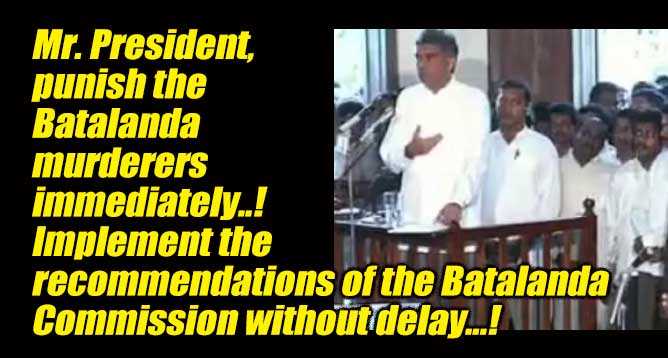-Written by a special correspondent

(Lanka-e-News -18.Oct.2024, 11.20 pm) There was a time in our country when a lawyer was abducted, tortured inhumanely, and killed. The first victim of this brutal era, standing for human rights, was a young lawyer named Wijedasa Liyanarachchi. He was tortured and killed on September 24, 1988, at the Batalanda torture chamber. International human rights organizations focused their attention on these crimes. Following immense global criticism, J.R. Jayewardene’s government had 15 lawyers who stood for human rights against illegal detentions gunned down by unidentified assassins, with no evidence ever found. This is one of the most tragic events in modern Sri Lankan history and even in world history.
Now, 35 years have passed since these brutal killings. Among the victims were notable figures such as Charitha Lankapura, Kanchana Abeypala, Sanath Karaliyadda, Sepala Ratnayake, Tudor Keerthinanda, Amara Wellappili, Leslie Yatanwala, and Deshapriya Bandara. The criminals responsible for these murders, and those who aided them, must be held accountable. These lawyers stood for the protection of the lives of Janatha Vimukthi Peramuna (JVP) members and their supporters. They appeared in court to fight against the inhumane actions of J.R. Jayewardene’s government, advocating for justice on behalf of their clients. However, the regime was so barbaric that it resorted to assassinating these lawyers.
Many of the killers now live abroad, under the protection of the ruling class. Some are even employed in foreign embassies and high commissions. It is shameful that those who supported such crimes continue to hold high positions in the country.
Meanwhile, some lawyers who escaped these killings are still living abroad. These lawyers and the families of the murdered lawyers are now appealing to the new president to ensure justice for these heinous crimes during his tenure.
Since the wave of assassinations, seven presidents have come to power, but none have responded to these crimes. In response to pressure from both local and international human rights organizations, former President Chandrika Bandaranaike Kumaratunga appointed a special Presidential Commission to investigate these incidents. The commission was chaired by two Supreme Court judges and was known as the Batalanda Commission. The commission was tasked with investigating the illegal detention centers and torture chambers established at the Batalanda housing scheme between January 1, 1988, and December 31, 1990. The commission’s work began on September 21, 1995, and concluded in October 1997. The final report, consisting of 6,780 pages in 28 volumes, was handed over to the president on March 28, 1998.
The commission found that around 60 torture chambers had been operated across the country, many in government buildings, rented private residences, and public places. The infamous Batalanda torture chamber was exposed when a few detainees managed to escape and reveal the horrific details.
On March 27, 1998, the Batalanda Commission’s report was handed over to President Chandrika. Although the report indicated that prominent figures, including Ranil Wickremesinghe, were responsible, no action was taken. The commission recommended that Wickremesinghe be stripped of his civic rights. However, President Chandrika Kumaratunga did not implement any of these recommendations, even delaying the public release of the report for two years.
When asked why she hadn’t acted on the commission’s findings, Chandrika made a strange statement, saying she did not want to subject anyone to the same fate her mother had suffered when her civic rights were stripped. This explanation was unlikely to satisfy the thousands of families who had lost loved ones during this dark period. Many people still believe that justice for these crimes remains unfulfilled.
In conclusion, several officials were directly named in the Batalanda report for their involvement in illegal detention, torture, and killings. Among them were Assistant Superintendent of Police Douglas Peiris, Chief Inspector Ranjith Wickremesinghe, and others. These individuals must be held accountable for their actions under the constitution. The report also implicated Ranil Wickremesinghe, who was found to have given unlawful directives during meetings at the Batalanda housing scheme, overstepping his authority.
The public awaits justice for these crimes, and the implementation of the Batalanda Commission’s recommendations remains a crucial step toward accountability.
---------------------------
by (2024-10-18 18:03:35)
Leave a Reply